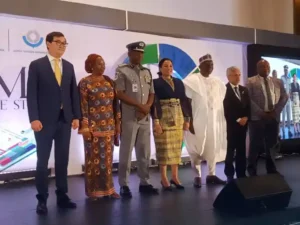 Joyce Mmereole Okoli
Joyce Mmereole Okoli
In a move aimed at enhancing trade facilitation and efficiency at ports, the Nigeria Customs Service (NCS) launched the Time Release Study (TRS) on Thursday. The TRS, a globally recognized tool, systematically measures the time taken to release cargo, involving Customs and other government agencies.
The Comptroller General of the Service, Bashir Adewale Adeniyi, revealed that the Tin Can Island ports command would be the pilot area for this initiative.
Emphasizing international standards, Adeniyi highlighted TRS as a critical step towards optimizing trade facilitation and assisting stakeholders in the process.
Adeniyi underscored the significance of adopting a scientific and data-driven approach, emphasizing that TRS provides detailed insights into the efficiency of customs operations. The TRS methodology, developed by the World Customs Organisation (WCO), aims to identify bottlenecks and inefficiencies accurately, contributing substantially to national development.
Reflecting on past TRS implementations, Adeniyi highlighted progress since 2010, including paperless clearance and advancements in the Authorized Economic Operator (AEO) program. The launch aligns with President Bola Ahmed Tinubu’s policy targets for effectiveness and efficiency in trade facilitation and economic reform.
The Minister of Industry, Trade, and Investment, Dr. Mrs. Doris Uzoka-Anite, commended the launch, stating it would benefit businesses by addressing trade regulation violations and checking bottlenecks.
She added that considering issues of trade regulation violation such as under-declaration and concealment, TRS will be useful.
The Minister urged Customs to always focus more on trade facilitation which according to her will increase volume of trade and also revenue generation.
The Director General of the Nigerian Maritime Administration and Safety Agency (NIMASA), Dr. Bashir Jamoh, praised Customs’ commitment to changing narratives and urged collaboration to address port bottlenecks.
Jamoh recalled that consecutively the blame had been pushed to the doorsteps of Customs even when all are involved in the delay experienced at the ports.
He said that it is for all to join hands with Customs to address whatever bottlenecks at the ports.
Minister of Marine and Blue Economy, Mr. Adegbeyega Oyetola, duly represented by Barr Pius Akutah, described TRS as a unique analysis enhancing Customs processes for efficiency.
Noting that the tool will reduce barriers in trade facilitation, Oyetola said it will lead to improving on ship on ship turnaround time.
He commended the WCO for the TRS and Customs for adopting the technology to improve on trade efficiency.
Benefits of TRS include improving and strengthening the efficiency of Customs administration, exploring synergies with stakeholders, and accelerating the international movement of cargo. The initiative aligns with efforts to streamline customs procedures, reduce barriers in trade facilitation, and enhance the supply chain..

